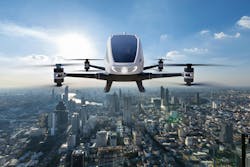AIRO Group joins MACADA initiative to advance detect-and-avoid systems for eVTOLs and UAVs
Summary Points:
- AIRO Group Holdings joined Thales Canada, Vertiko Mobilité, and Jaunt Air Mobility Canada in the MACADA detect-and-avoid development initiative.
- The project focuses on enhancing DAA systems for eVTOL and UAV integration into shared airspace.
- Technical priorities include energy management, simulation, prototyping, and flight testing.
MCLEAN, Va. - AIRO Group Holdings Inc. in McLean, Va. announced its participation in the MACADA (MAturity of Collaborative Avoidance Development Approach) initiative, a Canadian-led research and development program focused on advancing air collision avoidance technologies for electric vertical take-off and landing (eVTOL) aircraft and uncrewed aerial vehicles (UAVs).
The project brings together Thales Canada in Montreal, Vertiko Mobilité Inc. in Montreal, and Jaunt Air Mobility Canada in Mirabel, Quebec, which is a subsidiary of AIRO Group dedicated to advancing urban air mobility (UAM). The collaboration aims to enhance system maturity for detect-and-avoid (DAA) solutions that enable safer integration of advanced aircraft into shared airspace.
MACADA goals
MACADA focuses on improving several key technical areas, including energy management optimization, realistic operational scenario simulations, hardware prototyping, and flight testing to validate system performance. The initiative also supports the broader INSAT program, which emphasizes aircraft architecture, systems integration, and operational support.
"MACADA represents a significant step forward in ensuring safe and efficient integration of UAVs and eVTOLs into shared airspace," said Captain Joe Burns, CEO of AIRO Group Holdings in McLean, Va. "This initiative is not just about solving a technical challenge—it’s about laying the groundwork for a fully integrated Advanced Air Mobility ecosystem."
Eric Côté, president of Jaunt Air Mobility Canada, said the project reflects the strength of Canadian aerospace collaboration. "By developing smarter detect-and-avoid systems, we’re helping pave the way for optimized, shared airspace that benefits both industry and the public," Côté said.
AIRO’s participation in MACADA supports its broader strategy in advanced air mobility (AAM), which includes the development of eVTOL and uncrewed systems for civil and defense applications. The company said these technologies are aligned with its focus on autonomy, connectivity, energy optimization, and intelligent systems.
"The MACADA initiative marks another milestone in advancing AIRO’s electric air mobility business," said Dr. Chirinjeev Kathuria, executive chairman of AIRO Group Holdings. "Efforts like this demonstrate the importance of developing not only the technologies but also the frameworks needed to safely integrate next-generation aircraft into airspace operations."
About the Author
Jamie Whitney
Senior Editor
Jamie Whitney joined the staff of Military & Aerospace Electronics in 2018 and oversees editorial content and produces news and features for Military & Aerospace Electronics, attends industry events, produces Webcasts, and oversees print production of Military & Aerospace Electronics.
